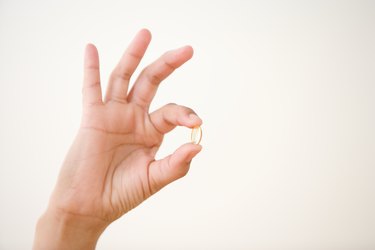
An abnormal buildup of fluid in the lower extremities is known as leg edema. It is a common problem, especially with increasing age. Leg swelling has many causes including inflammation, obesity, blood clots in the legs, or a weakened heart. Each of these conditions, along with the pressure of gravity, makes it difficult for blood to circulate up from the legs. The blood then pools in the veins. Swelling is usually more noticeable toward the evenings. Many treatments are available for leg swelling, including elevation of the legs, exercise, decreasing salt in the diet and consuming regular vitamins.
B Vitamins
Video of the Day
The B-complex vitamins are water-soluble vitamins necessary for metabolizing fat and proteins. These vitamins are also required for blood cell formation, brain and nervous system function. A deficiency in the B vitamins, specifically B-1 and B-2 are a common cause of extremity swelling. Lack of vitamin B-1, for instance, can cause fluid increases around the heart, leading to the heart's inability to pump correctly and causing leg swelling. Following a diet with meats, pork and whole grains can decrease chances of a deficiency. B vitamin supplements are also available over the counter. Never start taking a supplement without consulting your physician first.
Video of the Day
Vitamin C
Vitamin C is a water-soluble vitamin and antioxidant. The body requires vitamin C for the blood vessels, bones, tendons, nerves and immune system. Antioxidants decrease the signals that cause inflammation and protect the cells.This can decrease or even stop swelling. Vitamin C cannot be stored in the body and must be taken in by diet or supplements. Citrus fruits, broccoli and peppers contain significant amounts of vitamin C. If your diet does not provide enough vitamin C, your doctor may suggest a supplement. Do not start taking vitamin C supplements without your doctor's knowledge.
Vitamin D
Vitamin D is a fat-soluble vitamin that can be consumed from food or produced by the body when exposed to the sun. Vitamin D is needed to absorb calcium required for strengthening bones. It is also beneficial for decreasing inflammation and swelling. The University of Maryland Medical Center also notes that vitamin D might lower the risk of preeclampsia during pregnancy, a condition that causes swelling of the feet. Sources of vitamin D are dairy, tuna, salmon, and cod. If your doctor determines you need more vitamin D, supplements can be taken in capsule or tablet form.
Other Nutritional Factors
While some vitamins might help combat swelling in your legs under some circumstances, other factors in your diet play a role as well. Consuming too much sodium, for example, causes your body to retain fluid and might worsen swelling. Focus on a diet rich in low-sodium foods -- such as lean protein, whole grains and fresh fruits and veggies -- and forego processed foods to avoid consuming too much sodium.
- Medline Plus: Foot, Leg and Ankle Swelling
- University of Maryland Medical Center: Vitamin B1 (Thiamine)
- Linus Pauling Institute: Vitamin C
- Office of Dietary Supplements National Institutes of Health; Vitamin D
- Linus Pauling Institute: Sodium (Chloride)
- University of Maryland Medical Center: Preeclampsia
Is this an emergency? If you are experiencing serious medical symptoms, please see the National Library of Medicine’s list of signs you need emergency medical attention or call 911.